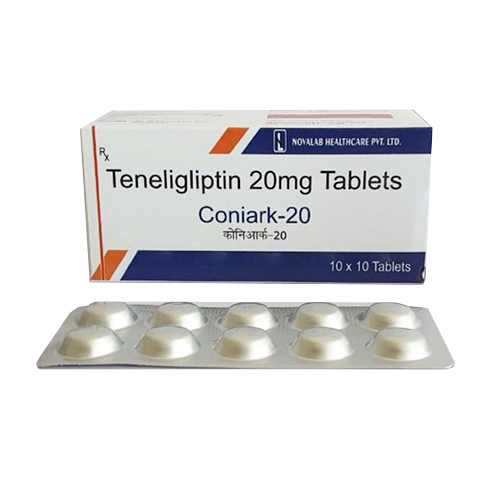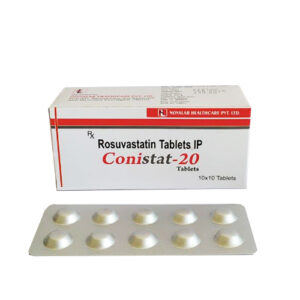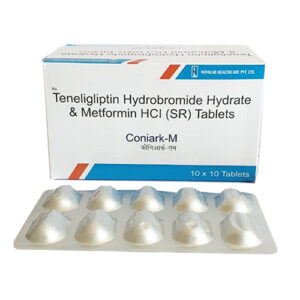- Home
- CARDIAC/DIABETIC PRODUCTS
- Teneligliptin Tablets

Teneligliptin Tablets
CONIARK-20
Enquiry about Teneligliptin Tablets

Teneligliptin is an oral medication used to manage type 2 diabetes. It belongs to the dipeptidyl peptidase-4 (DPP-4) inhibitor class, enhancing insulin production and reducing blood sugar levels. By inhibiting DPP-4, it prolongs the activity of incretin hormones, aiding glucose regulation after meals. This drug is typically taken once daily and is well-tolerated, often prescribed alongside diet and exercise for effective diabetes management. However, its use should be under medical supervision, considering individual health conditions and potential side effects. Regular monitoring and adherence to prescribed dosages are essential for optimal outcomes in diabetes treatment.
Benefits of Using Teneligliptin Tablets
Teneligliptin tablets offer significant benefits for individuals with type 2 diabetes. As a DPP-4 inhibitor, Teneligliptin enhances insulin secretion while decreasing glucagon production, effectively lowering blood sugar levels. It aids in managing diabetes by stabilizing glucose after meals, reducing HbA1c levels, and promoting overall glycemic control. The once-daily dosing regimen ensures convenience and adherence. Additionally, it’s associated with a low risk of hypoglycemia and weight neutrality. Teneligliptin can be a valuable component of a comprehensive treatment plan, potentially improving the quality of life for those dealing with type 2 diabetes while minimizing adverse effects. Regular monitoring and healthcare supervision remain essential.
How to Use Teneligliptin Tablets
Teneligliptin tablets are typically taken orally once a day, with or without food. The standard dosage is usually 20 milligrams per day, but it’s crucial to follow the prescribed dose provided by your healthcare professional, tailored to your specific needs and medical condition. Swallow the tablet whole with a glass of water, and do not crush or break it. If you miss a dose, take it as soon as you remember, but skip it if it’s almost time for the next scheduled dose. It’s essential to maintain a consistent daily dosing schedule to effectively manage blood sugar levels. Always follow your doctor’s instructions for the best results. Regular monitoring of blood glucose levels is also advised.
How Teneligliptin Tablets Work
Teneligliptin works by inhibiting the enzyme dipeptidyl peptidase-4 (DPP-4), enhancing the body’s natural ability to regulate blood sugar levels in individuals with type 2 diabetes. DPP-4 breaks down incretin hormones that stimulate insulin release and reduce glucagon secretion. By blocking DPP-4, Teneligliptin extends the action of these incretin hormones, resulting in increased insulin production and decreased glucagon levels. This mechanism helps control post-meal blood glucose spikes, improving overall glycemic control and reducing HbA1c levels. The medication’s efficacy in managing diabetes makes it a valuable tool in comprehensive diabetes treatment when used in conjunction with a healthy lifestyle and diet.
Precautions While Using Teneligliptin Tablets
When using Teneligliptin tablets, certain precautions are vital for safe and effective treatment. First, follow the prescribed dosage and administration instructions meticulously, never exceeding the recommended amount. Inform your healthcare provider about any allergies, existing medical conditions, or ongoing medications to avoid potential interactions. Regularly monitor blood sugar levels and attend follow-up appointments as scheduled. Be cautious if you have a history of pancreatitis or kidney disorders. Additionally, adhere to a balanced diet and exercise regimen as advised. Limit alcohol intake and consult a healthcare professional before using during pregnancy or breastfeeding. Overall, ensure open communication with your healthcare team for optimal results.
Side Effects of Using Teneligliptin Tablets
While Teneligliptin tablets are generally well-tolerated, they might cause side effects in some individuals. Common side effects include headache, upper respiratory tract infections, joint pain, and gastrointestinal issues like nausea or diarrhea. In rare cases, allergic reactions such as rash, itching, or swelling might occur. Additionally, there have been reports of pancreatitis, hypersensitivity reactions, and liver function abnormalities. It’s crucial to promptly report any unusual symptoms to a healthcare professional. People with a history of allergic reactions or pancreatic issues should exercise caution. Regular monitoring and medical supervision help mitigate potential risks and ensure a safe treatment experience.
Related products
We are a research-based pharmaceutical company. The mission of Novalab Healthcare is to improve the health of the Indian community by providing them with quality.
Quick Links
Location
- Plot No-208, Industrial Area Phase 1, Panchkula, Haryana 134113
- Novalab7777@gmail.com
- +91-9570599567
- +91-9115604598
Map
Copyright by © 2025 Novalab Healthcare | Web Development and Marketing By Web Hopers







